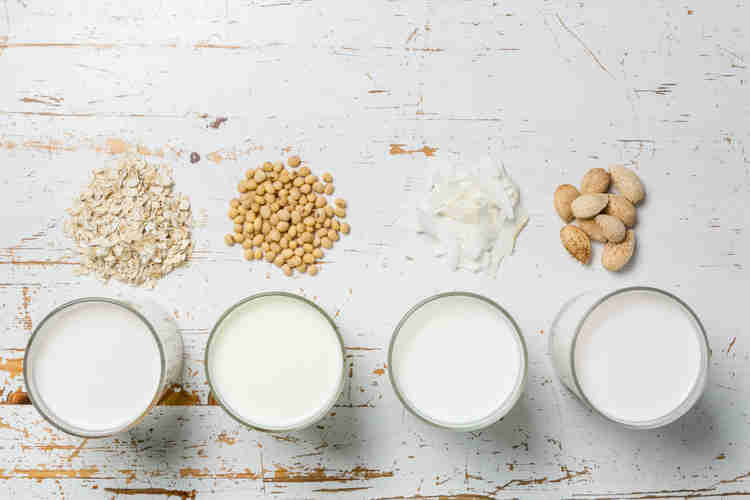There are many reasons to opt for plant-based alternatives to traditional milk and dairy products. Choosing plant-based milk alternatives can reduce exposure to harmful hormones and contaminants, while also lessening the impact of your food choices on the environment. Add in the associated reduction in cancer and diabetes risks, and it becomes obvious why so many people of getting plant milk curious. However, the choices can seem overwhelming these days, with almond, soy, rice, coconut, oat, cashew, hemp and more to choose from! You may wonder how to make the right choice.
The first question to ask is: what are your goals? Are looking for a beverage option that packs some protein? Do you have dietary restrictions, such as nut free, gluten free, or low FODMAP? Do you need something that is easily digestible, higher in fat, fortified with Vitamin D and calcium? Your answer to these and other questions will determine the best plant milk choice for you. Here is an overview of the most popular varieties so that you can make the best decision for YOU!
Oat Milk
Oat milk has soared in popularity in the last few years. Due to its natural sweetness, it is a favorite in coffee shops for dairy-free lattes and cappuccinos. It also works well in smoothies for the same reason. With 14 g of carbohydrate per 8 oz serving, oat milk can work well for athletes looking for a fueling and/or recovery beverage. On the other hand, those limiting their carbohydrate intake may want to look elsewhere.
Soy Milk
Soy milk has a much longer and more extensive history, primarily going back to China and other Asian countries. At 7 g of protein per 8 oz serving, soy milk protein content is roughly the same as cow’s milk and the highest of the popular plant milks. The most common concern people have relates to a desire or belief that soy consumption should be minimized due to potential adverse health effects. While it is true that many processed foods contain unhealthy soy derivatives, research has shown that consumption of whole, minimally processed soy products is compatible with a healthy diet and even offers specific health benefits. That being said, individuals with IBS need to be aware of which soy products are compatible with their diet.
Coconut Milk Beverage
While oat milk is rich in natural carbohydrates, and soy milk packs significant plant protein, coconut milk beverages (so-called because the kind you drink is different from the kind you cook with) are rich in plant fat. Coconut is unique in the plant world in containing saturated fat. Fat is important in carrying flavors and achieving a certain mouth feel, which is why I usually recommend coconut products in cooking (and non-dairy ice creams!). Regardless, if you’re looking for a dairy replacement with a higher fat content, coconut is a good option. Despite its high fat content, coconut milk beverages are still relatively low in calories, at ~50 calories per serving, due to minimal carbohydrate and protein content.
Almond Milk
Almond milk was an early entrant in the field of plant-based milks. Since its initial soaring popularity, concerns arose regarding impact of almond farming practices on the environment. In addition, almond milk has little to offer nutritionally over other plant milks. Still, some individuals prefer the mild flavor of almond milk. There are now some blends on the market, which may improve both the nutritional profile and environmental impact of almond alone.
Conclusion
Given all the plant milk options available, everyone should be able to find one that meets their nutritional and lifestyle needs. There are certainly health benefits to reducing your consumption of cow milk products. Consider your goals and nutritional needs are and choose the one that fits best!
Sources
1. Fischer, W.J. & Schilter, Benoit & Tritscher, Angelika & Stadler, Richard. (2011). Contaminants of Milk and Dairy Products: Contamination Resulting from Farm and Dairy Practices. Encyclopedia of Dairy Sciences. 887-897. 10.1016/B978-0-12-374407-4.00104-7.
2. Synnove Knutsen, Rawiwan Sirirat, Andrew Mashchak, Michael Orlich, Karen Jaceldo-Siegl, Gary E Fraser. Dairy, soy, and risk of breast cancer: those confounded milks. International Journal of Epidemiology, 2020; DOI: 10.1093/ije/dyaa007
3. Chia, J., McRae, J., Kukuljan, S. et al. A1 beta-casein milk protein and other environmental pre-disposing factors for type 1 diabetes. Nutr. Diabetes 7, e274 (2017). https://doi.org/10.1038/nutd.2017.16
